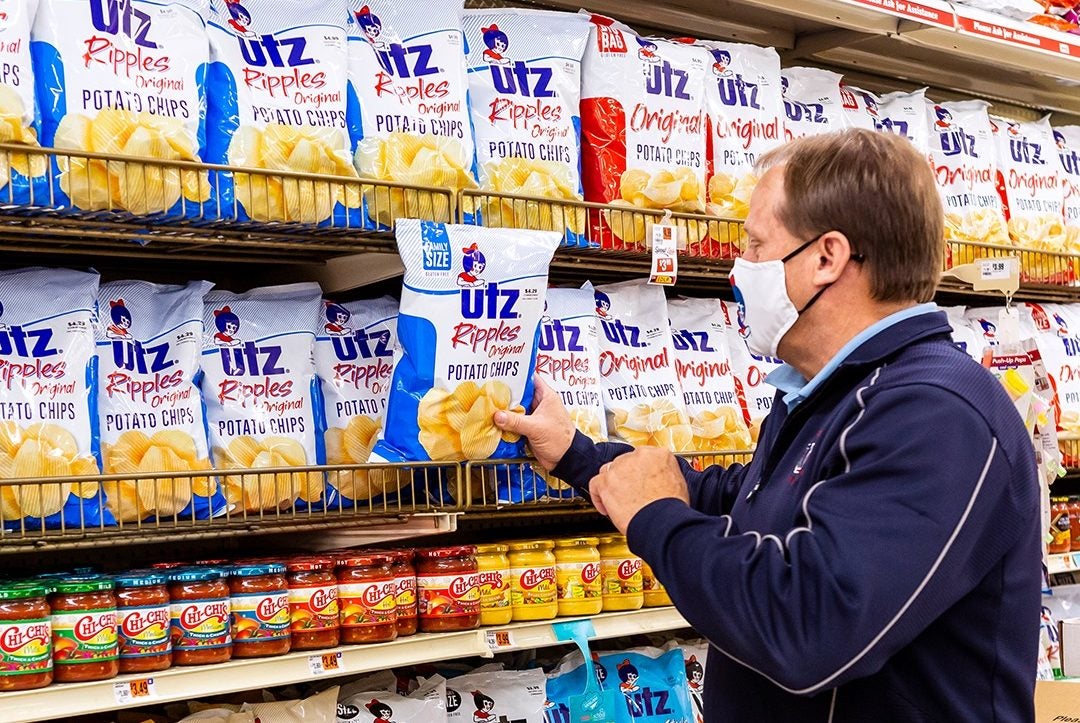
Utz Brands has described the inflationary impact on input costs from the war in Ukraine as “meaningful” as the US snacks maker upped its annual sales forecast.
Publicly-listed Utz, which expanded its portfolio through a trio of M&A deals last year – RW Garcia, Festida Foods, Vitner’s – said cooking oils, wheat flour and crude oil costs had all risen as a result of the conflict in Ukraine, now in its third month.

Discover B2B Marketing That Performs
Combine business intelligence and editorial excellence to reach engaged professionals across 36 leading media platforms.
Utz now expects its gross cost inflation in the mid-to-high teens for the fiscal year, up from a previous estimate of low double digits, CEO Dylan Lissette said, noting the company is also seeing elevated labour, transport and freight expenses.
Ukraine was the world’s largest exporter of sunflower oil before Russia’s invasion, with the consequent shortages prompting some food manufacturers like Iceland to turn to alternatives.
Meanwhile, the worn-torn country is one of the world’s largest suppliers of wheat behind Russia, while invading Russia is a major oil producer and exporter.
However, Indonesia, the top producer of palm oil, recently introduced an export ban on the commodity to protect domestic supplies.

US Tariffs are shifting - will you react or anticipate?
Don’t let policy changes catch you off guard. Stay proactive with real-time data and expert analysis.
By GlobalData“Since we last reported, the ongoing Russia and Ukraine conflict is impacting certain input costs meaningfully,” Lissette explained on a first-quarter results call with analysts. “The step-up that we are seeing is significant on cooking oils, all the different oils that we use in our products.”
He added: “And then there is a step-up on wheat flour, as well as packaging; some of our packaging costs are really tied to what happens with crude oil prices. Fuel … that has stepped up as well. Transportation rates, freight rates, they stepped up.”
Nonetheless, Utz took pricing actions in the quarter ended 3 April totalling 9.4% and still generated a volume increase of 11.3%. “Price elasticity is better than we anticipated,” Lissette inferred.
Further pricing actions could also be in the pipeline depending on how gross inflation pans out, with Utz anticipating 10% in average price increases over the course of the full year.
“It’s very important to note that as inflation continues to rise, we continue to take pricing actions and drive our productivity initiatives to fully offset these increased costs, all while making the necessary investments to support the strong growth of our brands,” the CEO said.
“With this continued momentum, we believe that our Q2 pricing will be greater than the 9.4% pricing we achieved in Q1. In addition to this, we have incremental pricing actions under evaluation for the second half of the year to help offset any new inflation impact beyond our current expectations.”
That said, the crisps, tortilla chips, pretzels and pork-rinds maker is bracing for a potential hit to volumes in the second half of the fiscal year from the pricing actions. It is also looking to cut some product lines to focus on Utz’s so-called power brands such as On the Border and the company’s namesake lines.
CFO Ajay Kataria explained: “We are expecting price elasticities and SKU rationalisation, [and] market dynamics to suppress volumes in the second half. The economics theory will tell us that at some point, [the] consumer is going to react to the multiple rounds of pricing and inflation, but we really hope that we’re wrong about that, and we are just being prudent, and frankly, conservative on that.”
Utz’s first-quarter reported sales rose 27% to US$340.8m and were up 20.7% in organic terms. However, adjusted EBITDA declined 4% to $36.5m and adjusted net income was down 18.9% at $15.4m.
Lissette said EBITDA was weighed by increased supply chain costs on margins, partly offset by the pricing actions and “productivity momentum”, factors behind Utz’s improved outlook.
The company expects net sales to rise 10-13% this year, from 7-10% previously, and organic revenues to climb 8-10% from a prior estimate of 4-6%. EBITDA guidance remains unchanged for “modest growth”.
“We expect net sales in dollars to be slightly more first-half weighted given our strong Q1 sales performance and the expected impact from strategic SKU rationalisation and price elasticity in the second half of the year,” Lissette explained.





